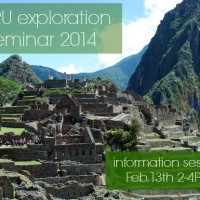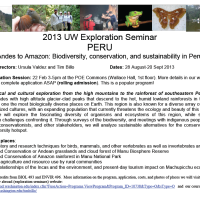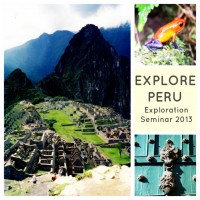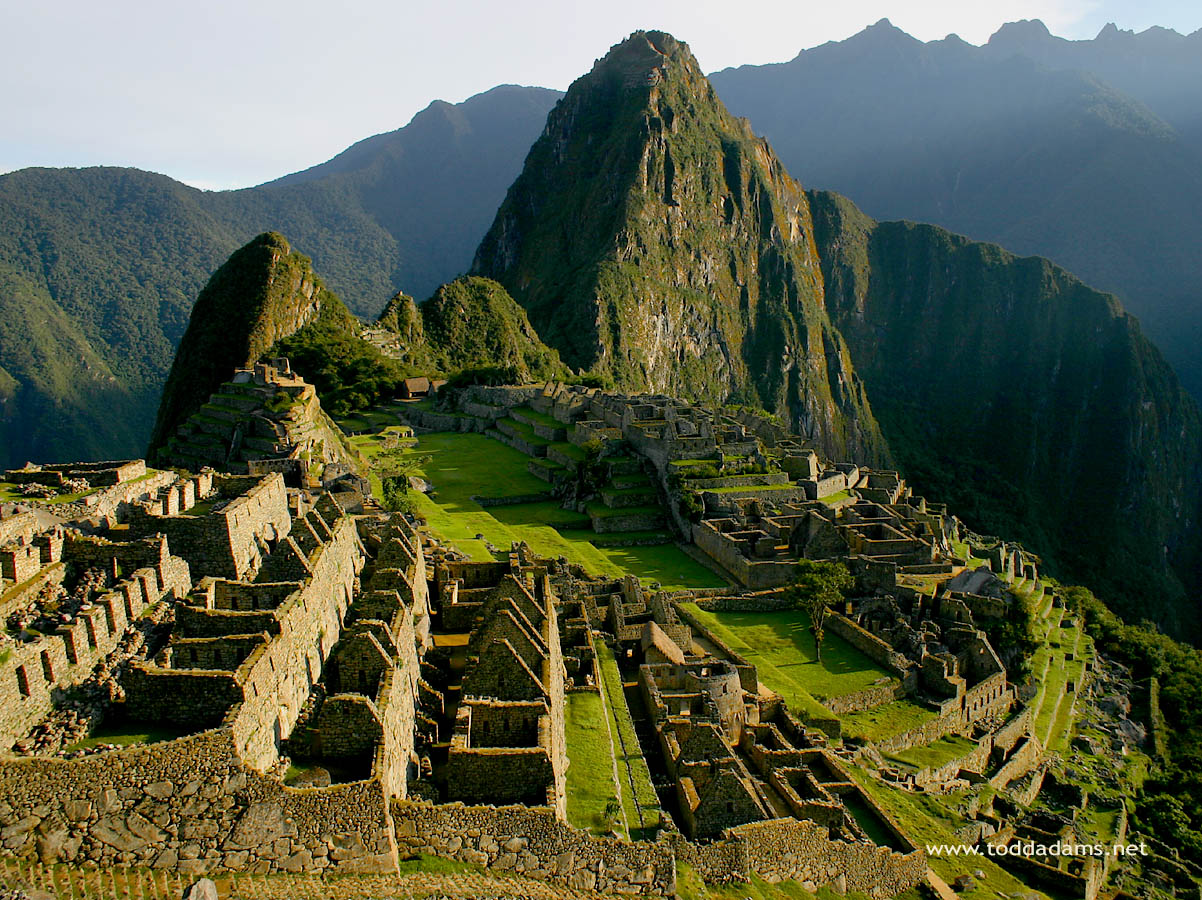Program Description
2011 Exploration Seminar in Peru
From Andes to Amazon: Biodiversity, conservation, and sustainability
An ecological and cultural exploration from the high mountains to the rainforest of southeastern Peru
Program Directors: Eileen O’Connor, Ursula Valdez, and Tim Billo
Dates of instruction: August 28th-September 20th, 2011
The eastern slope of the Peruvian Andes ranges from altitudes of over 20,000 feet among rugged, glacier-clad peaks, to altitudes of under 500 feet in the hot, humid forests of the Amazon Basin, one of the most biologically diverse place on Earth. This region is also known for a diverse array of indigenous and modernized cultures, with an expanding population that threatens to alter the ecology and sheer beauty of this landscape forever. In this seminar, we will explore the fascinating diversity of organisms and ecosystems from the Andes to the Amazon of southeastern Peru, while studying the conservation challenges confronting this region. Through surveys of the biodiversity itself, and meetings with indigenous people, land-use managers, conservationists, and other stakeholders, we will analyze sustainable alternatives for the conservation of this world biodiversity hotspot.
Our program will begin in the mountains of Cusco where we will visit Quechuan communities, descendants of the Incas, to learn about traditional agriculture and resource use in practice. From here, we will also visit the world famous ruins of Machu Picchu, where we will learn about the historical relationship of the Incas to their environment, and the effects of present-day tourism on neighboring cloud forest ecosystems. Six days will be spent in the cool highlands of the Manu Biosphere Reserve, where we will spend time in protected grasslands and cloud forests identifying plants, insects, birds, and mammals using a variety of study techniques (including mistnetting for birds). There are many unique species to see here including some of the last remnants of Polylepis forests, ancient cycads, dozens of orchid species, and animals like the spectacular Andean Condor, Andean Cock of the Rock, Golden Headed Quetzal, and the rare Spectacled Bear.
During the second half of our course, we will stay at a remote field station on the Madre de Dios River, a tributary of the Amazon. The sheer number of species and the complexity of ecological interactions here are mind-boggling. Colorful fruit-eating birds, raucous macaws, monkeys and other arboreal mammals, butterflies, and an astonishing number of insects will be some of the many species you will see day to day. Boating trips on the river and a nearby oxbow lake may provide glimpses of the threatened Giant River Otter, rare Harpy Eagles, and large caimans. We will also be aware of intense pressures from currently expanding “modern-day” human activities such as cattle ranching, deforestation, gold mining, and road building, all of which threaten this great forested region.
In this seminar, you will be working closely with peers from the UW, applying your personal curiosity or expertise to two small-group projects, one each in the Andes and the Amazon, relating to biological resources and/or conservation. The program directors and Peruvian researchers, will guide you and share their combined expertise in ecological, sociological, and anthropological methods to gather relevant data, as well as their perspectives on conservation in the region. Be prepared to learn more, however, from the experiences we will have in the field as we travel through stunning landscapes full of natural and cultural wonders!
Students will earn 5 graded credits from the Biology department (BIOL 493) or the Program on the Environment (ENVIR 496). Participants will be evaluated on a daily journal of observations and reflections, a written report, and a presentation at a symposium, as well as positive participation throughout the course. The skills learned and applied in this program will be invaluable for any future endeavor – whether the student pursues a career in natural and social sciences, conservation, or any kind of work requiring a multidisciplinary approach and cross-cultural skills.
This Program Includes: All in-country transportation after arrival in Cusco, Peru international airport tax, all housing, 3 meals per day, and all field trips and visits during the program (including Machu Picchu).
Student costs:
$ 3,300 Program Fee
$ ~250 IPE Fee
Additional costs: Round trip travel to Cusco, immunizations, ISIC card, insurance, and personal spending money.
More information on the program, including financial aid, can be found at http://depts.washington.edu/explore/




